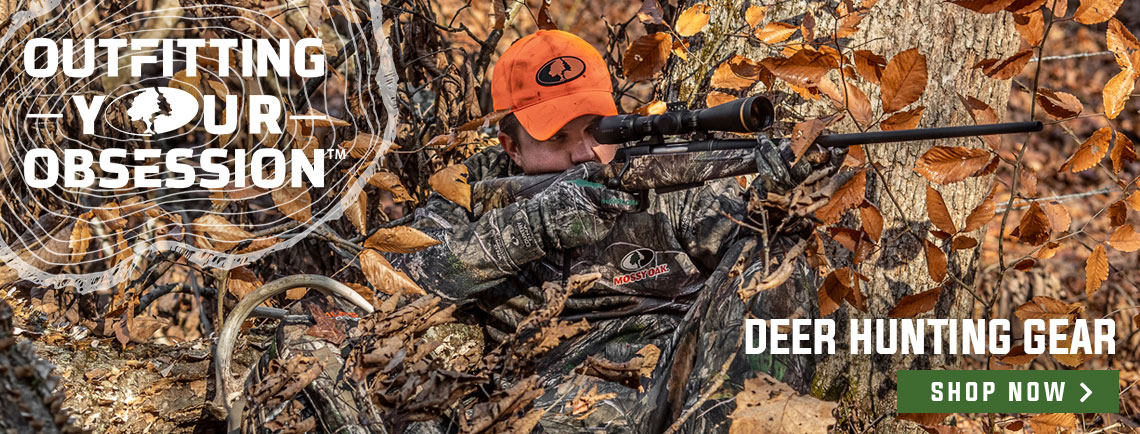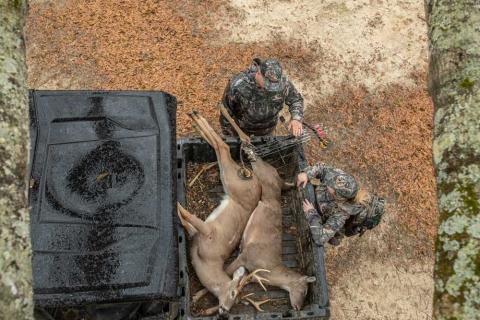William W. (Bill) Gabbard

Reloading for a new caliber is always an adventure, but loading for one that has just been introduced and has minimal information available is almost scary. I have been loading center-fire rifle ammunition for years, but when I started this project there was nothing published, on paper or the internet, as far as loading the 6.8 Western.
Aaron Oelger from Hodgdon was first to my rescue with the reloading data that his folks had compiled using the great selection of powder from the Hodgdon and IMR and bullets ranging from 130 grainers up to 170. Shortly thereafter, Geoff Esterline of Capstone Precision provided me with data that Capstone had developed for their Berger 170 grain EOL Elite Hunter. Capstone’s data included their VihtaVuori line of powders as well as powder from other manufacturers. Redding supplied me with a set of early production dies to get things going. Armed with dies, data, and brass that I saved from testing the Winchester XPR with Winchester and Browning factory ammo, along with some “heavy for caliber bullets” from Berger and Hornady, I was ready to start.
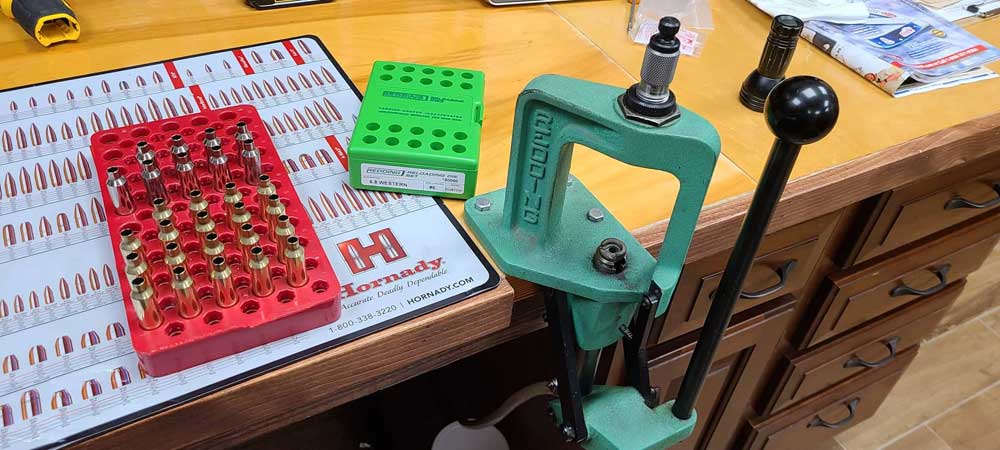
I pulled a bullet on the factory ammo to determine new case length. Unfired brass measured 2.003, so I kept all brass trimmed to a length of 2.006 which was the length of the shortest once-fired brass. The 6.8 Western is non-belted and headspaces on the shoulder. Using Hornady’s Bullet Comparator and a headspace gauge, I measured the shoulders to determine a starting point for headspacing. New unfired brass measurements ranged from 1.665 to 1.670. The once-fired brass all measured from 1.670 to 1.671. Since I did not have a neck sizing die, I adjusted the Redding Dies to set the shoulders all back to 1.669 to ensure a snug fit in the chamber without being too tight. This also insured that I was not overworking the brass.
The first bullet I worked with was the 170 grain Berger EOL. Berger’s data showed a cartridge overall length (C.O.L.) of 2.975. Jamming the bullets to the lands gave a C.O.L of 3.00. To ensure smooth feeding in the XPR magazine, I had to back the C.O.L. off to 2.970. Some folks try to seat the bullet as close as possible to the lands, but I have found that some rifles prefer a little jump to obtain their best accuracy. This seemed to work out pretty good for the XPR, Berger combination. I tried seven different powders with the Berger 170 and used a mid-range charge based on the load data provided by Capstone and Hodgdon. I used VihtaVuori N 560, N 565, and N 150. I used Hodgdon H 4831SC and IMR 4350. The Capstone data even included suggested loads for Alliant’s Reloader 19 and 22. H 4831SC, IMR 4831, and RL 22 all turned in groups of less than an inch. Both the N 565 and N 150 turned in groups of less than 0.5 inch. The group using the N 150 measured 0.188, which I thought was quite impressive for a slim barreled hunting rifle in a heavy caliber.
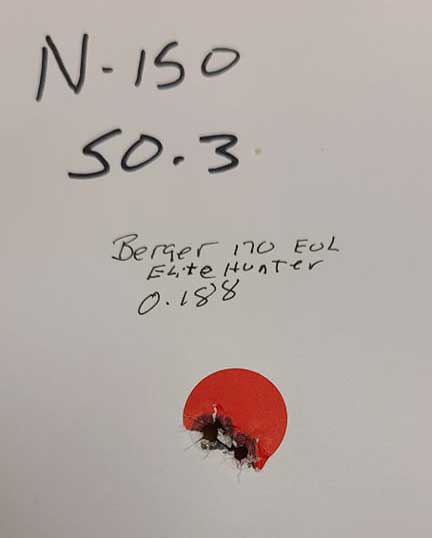
Below is a chart of the loads that shot groups of less than one inch. None of the combinations exceeded 2 inches.
Berger 170 EOL/C.O.L. 2.970
| POWDER | CHARGE WEIGHT | PRIMER | GROUP SIZE |
|---|---|---|---|
| VihtaVuori N 565 | 60.0 | WLRM | 0.929 |
| VihtaVuori N 565 | 60.6 | WLRM | 0.373 |
| VihtaVuori N 150 | 50.3 | WLRM | 0.188 |
| Hodgdon H 4861SC | 54.8 | WLRM | 0.824 |
| Hodgdon H 4831SC | 54.5 | WLRM | 0.678 |
| Hodgdon H 4831SC | 53.9 | WLRM | 0.534 |
| IMR 4350 | 51.3 | WLRM | 0.710 |
| Alliant RL 22 | 56.0 | WLRM | 0.978 |
The second bullet I tried was Hornady’s 145 ELD-X. The 6.8 Western was apparently designed with larger Western game in mind and the XPR used a 1-in-8 twist barrel to stabilize longer heavier bullets. I felt that the design of the 145 ELD-X should work well with this barrel. Knowing that a lot of hunters like myself primarily hunt Eastern Whitetail Deer, I wanted to see how the lighter weight bullets would work. Mid-range powder charges in the 6.8 were showing speeds with the 145s that exceed the famed .270 Winchester with 130-grain bullets. The 145 ELD-X as well as Hornady’s 150 SST are considerably longer than the traditional 130-grain bullets used in the 270.
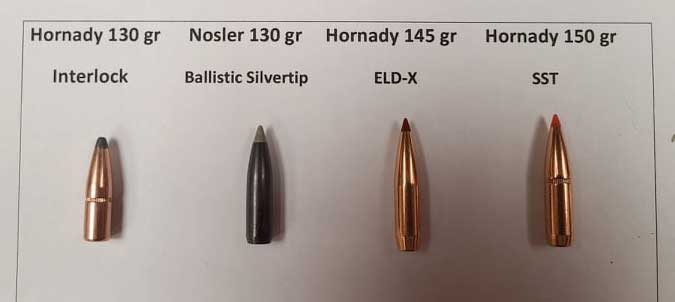
Using load data only from Hodgdon this time, (still the only source available) I tried every powder on my shelf that was listed on their website for the 6.8. I used IMR 4350, IMR 4451, IMR 4831. Moving on to the Hodgdon line, I used H 4350, H 4831SC, H 1000, and Retumbo. I used the C.O.L on the Hodgdon page. After two trips to the range and 18 three-shot groups, (yes, I spent a lot of time waiting for the barrel to cool) I had 11 three-shot groups under 1 inch, with one under 0.5 inch. Three more groups were 1.25 inches or less, and two of those had two shots touching with a flyer. Keep in mind that these were mid-range loads so there is plenty of room to fine-tune these loads to your rifle. Below are the best groups fired with each powder tested.
Hornady 145 ELD-X /C.O.L. 2.900
| POWDER | CHARGE WEIGHT | PRIMER | GROUP SIZE |
|---|---|---|---|
| IMR 4350 | 54.4 | WLRM | 0.366 |
| H 4350 | 53.5 | WLRM | 0.955 |
| IMR 4451 | 54.5 | R9 ½ M | 0.665 |
| IMR 4831 | 56.0 | R9 ½ M | 0.886 |
| H 4831SC | 57.5 | R9 ½ M | 0.935 |
| Retumbo | 65.0 | WLRM | 0.825 |
| H 1000 | 60.0 | WLRM | 1.015 |
The last bullet I tried was Hornady’s 150 grain SST. Although the ogive on the SST is not as sleek as the 145 ELD-X, it is still heavier that what most of us use in the 270 Winchester. It is one of the most common weights used in the 7MM Remington Magnum and based on numerous clean kills on whitetail with SST bullets in various calibers, I wanted to see how the 6.8 Western liked it. My Hodgdon data listed the same powders for the 150 SST as it did for the 145 ELDX. I again opted to start in the middle of the load range.
The data from Hodgdon used a different 150-grain bullet, so I built a dummy round and measured until I came up with a workable C.O.L. I loaded up some three-shot groups using the same seven powders that I used with the ELD-X and headed to the range again. Five of the seven groups were under an inch. The group fired with Retumbo was under 0.5 inch. I will point out that the two groups that exceeded one inch were under 1.5 and both of those had two good shots and a flyer.
Hornady 150 SST/C.O.L. 2.859
| POWDER | CHARGE WEIGHT | PRIMER | GROUP SIZE |
|---|---|---|---|
| IMR 4350 | 63.4 | WLRM | 1.460 |
| H 4350 | 54.8 | WLRM | 1.497 |
| IMR 4451 | 52.3 | R9 ½ M | 0.996 |
| IMR 4831 | 55 | R9 ½ M | 0.705 |
| H 4831SC | 56.5 | R9 ½ M | 0.844 |
| Retumbo | 63.4 | WLRM | 0.435 |
| H 1000 | 60.8 | WLRM | 0.783 |
As I stated in an earlier article, this round appears to be a reloaders dream. Three different bullets, a wide range of powder, and two different primers, all producing excellent groups. All these loads were mid-range loads and not a lot of time was spent tinkering with different powder charges, bullet seating, and primer testing. Each of the three bullets produced at least one group of less than 0.5 inch. With a little more time, several more of these loads could probably be adjusted to bring the group size under 0.5 inch.
Will the 6.8 Western be a commercial success? Only time will tell. It is a very versatile round that should be extremely capable of taking a wide variety of game, is easy to obtain accuracy with, and it is fun to shoot. I may just have to have one!

